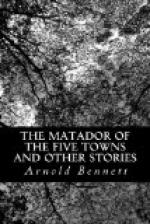“I say!” said Mr Cowlishaw.
“Beg yer pardon, sir,” the man whispered. “I’m getting forward with my work so as I can go to th’ fut-baw match this afternoon. I hope I didn’t wake ye, sir.”
“Look here!” said Mr Cowlishaw. “What’s that appalling noise that’s going on all the time?”
“Noise, sir?” whispered the man, astonished.
“Yes,” Mr Cowlishaw insisted. “Like something breathing. Can’t you hear it?”
The man cocked his ears attentively. The noise veritably boomed in Mr Cowlishaw’s ears.
“Oh! That!” said the man at length. “That’s th’ blast furnaces at Cauldon Bar Ironworks. Never heard that afore, sir? Why, it’s like that every night. Now you mention it, I do hear it! It’s a good couple o’ miles off, though, that is!”
Mr Cowlishaw closed his door.
At five o’clock, when he had nearly, but not quite, forgotten the sighing, his lifelong friend, the oval-wheeled electric car, bumped and quaked through the street, and the ewer and basin chattered together busily, and the seismic phenomena definitely recommenced. The night was still black, but the industrial day had dawned in the Five Towns. Long series of carts without springs began to jolt past under the window of Mr Cowlishaw, and then there was a regular multitudinous clacking of clogs and boots on the pavement. A little later the air was rent by first one steam-whistle, and then another, and then another, in divers tones announcing that it was six o’clock, or five minutes past, or half-past, or anything. The periodicity of earthquakes had by this time quickened to five minutes, as at midnight. A motor-car emerged under the archway of the hotel, and remained stationary outside with its engine racing. And amid the earthquakes, the motor-car, the carts, the clogs and boots, and the steam muezzins calling the faithful to work, Mr Cowlishaw could still distinguish the tireless, monstrous sighing of the Cauldon Bar blast furnaces. And, finally, he heard another sound. It came from the room next to his, and, when he heard it, exhausted though he was, exasperated though he was, he burst into laughter, so comically did it strike him.
It was an alarm-clock going off in the next room.
And, further, when he arrived downstairs, the barmaid, sweet, conscientious little thing, came up to him and said, “I’m so sorry, sir. I quite forgot to tell the boots to call you!”
II
That afternoon he sat in his beautiful new surgery and waited for dental sufferers to come to him from all quarters of the Five Towns. It needs not to be said that nobody came. The mere fact that a new dentist has “set up” in a district is enough to cure all the toothache for miles around. The one martyr who might, perhaps, have paid him a visit and a fee did not show herself. This martyr was Mrs Simeon Clowes, the mayoress. By a curious




